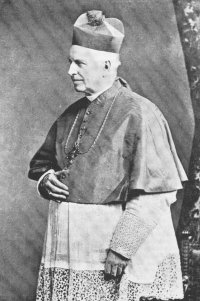

John Vertue was born on 28th April 1826. He was educated at King's College, London, St. Edmund's, Old Hall Green and, from 1849, the English College at Rome. He quickly gained a reputation for his theological and philosophical studies and was selected to preach the sermon in Latin before the reigning Pope, Pius IX on St. Stephen's Day.
In December 1851 Dr. Vertue was ordained priest and returned to England. He obtained his first post at Poplar where he worked with much zeal before being offered the position of Secretary to the Papal Emissary to the United States. On his return to Rome he was made Monsignor and returned again to England in 1854 where he had charge of a mission in Hackney.
In 1855 he became the Catholic Military Chaplain (4th Class) at Chatham, before being posted to Aldershot where he secured an excellent reputation with the soldiers. He stayed at Aldershot for 6 years before proceeding to Bermuda. Whilst there Yellow Fever broke out but he remained at his post ministering to the population with care and courage. He volunteered to remain in Bermuda when his term of service expired arguing that he had become acclimatised to the local conditions whereas any new appointee would probably succumb to the disease. The War Office awarded him a special Vote of Thanks.
Dr. Vertue returned to England in 1865 and was posted to Colchester as Army Chaplain 3rd Class, where he remained 6 years. He was promoted to Army Chaplain 2nd Class in 1870 and in 1871 was appointed chaplain at Portsmouth where in 1875 he was promoted to Army Chaplain 1st Class. He remained in Portsmouth until 1878 and then moved to Malta where he stayed until 1882.
During his military career Vertue was often referred to as "John the Magnificent" on account of his 'tall and dignified appearance and his love of precision and correctness' which referred as much to his dress as to his behaviour. He would never wear less than 'a good suit of broadcloth...and a chaplain's cap with flat peak and black braided band. When it was a full-dress military function, however, he wore a long frock coat with a colonel's crowns in gold braid on the collar, and a broad stripe of black braid on the trouser. Very often he was seen walking the streets in the full habit of an Italian priest, with buttoned cassock, flowing cloak, buckled shoes and a wide beaver hat...His garb always comprised, of course, the violet front of a Monsignore...' [Hegarty]
In 1882 the Diocese of Southwark was split into two with the new Portsmouth Diocese taking the western half. Dr. Vertue was selected to become the first Bishop of Portsmouth Diocese. In the years preceding 1882 the catholic community, ably led by Reverend John Horan, had been preparing the ground for the construction of a new parish church and by that date the first phase was complete. Thus it was that the new Bishop, who was consecrated on 25th July 1882, was able to open the new cathedral of St. John's, just two weeks later on 10th August. Between this date and the 23rd May 1900 when Dr. Vertue died, he oversaw the construction of 18 new churches in the diocese, together with 2 orphanages and many elementary schools. During his time in Portsmouth Dr. Vertue became a much respected presence in many branches of public life, particularly those engaged in historical studies. He was a fellow of the Society of Antiquaries, a member of the archaeological Institute and Vice-President of the Hampshire Record Society.
Bishop John Vertue is buried in the Horan Division of Highland Road Cemetery, Row 8, Grave 12. Such was the esteem in which he was held that after his death people of all classes contributed liberally to the creation of a chapel in his name within the cathedral. At a similar time a window in the Cathedral was dedicated to John Vertue.
Tim Backhouse, 2010
References
"Diocese of Portsmouth Past and Present" by Gerard Dwyer
"Padres to Prelates by Dr. James Hegarty
Additional information from David Blake (Curator, Armed Forces Chaplaincy Centre) and Val Fontana (Archivist, St. John's Cathedral)